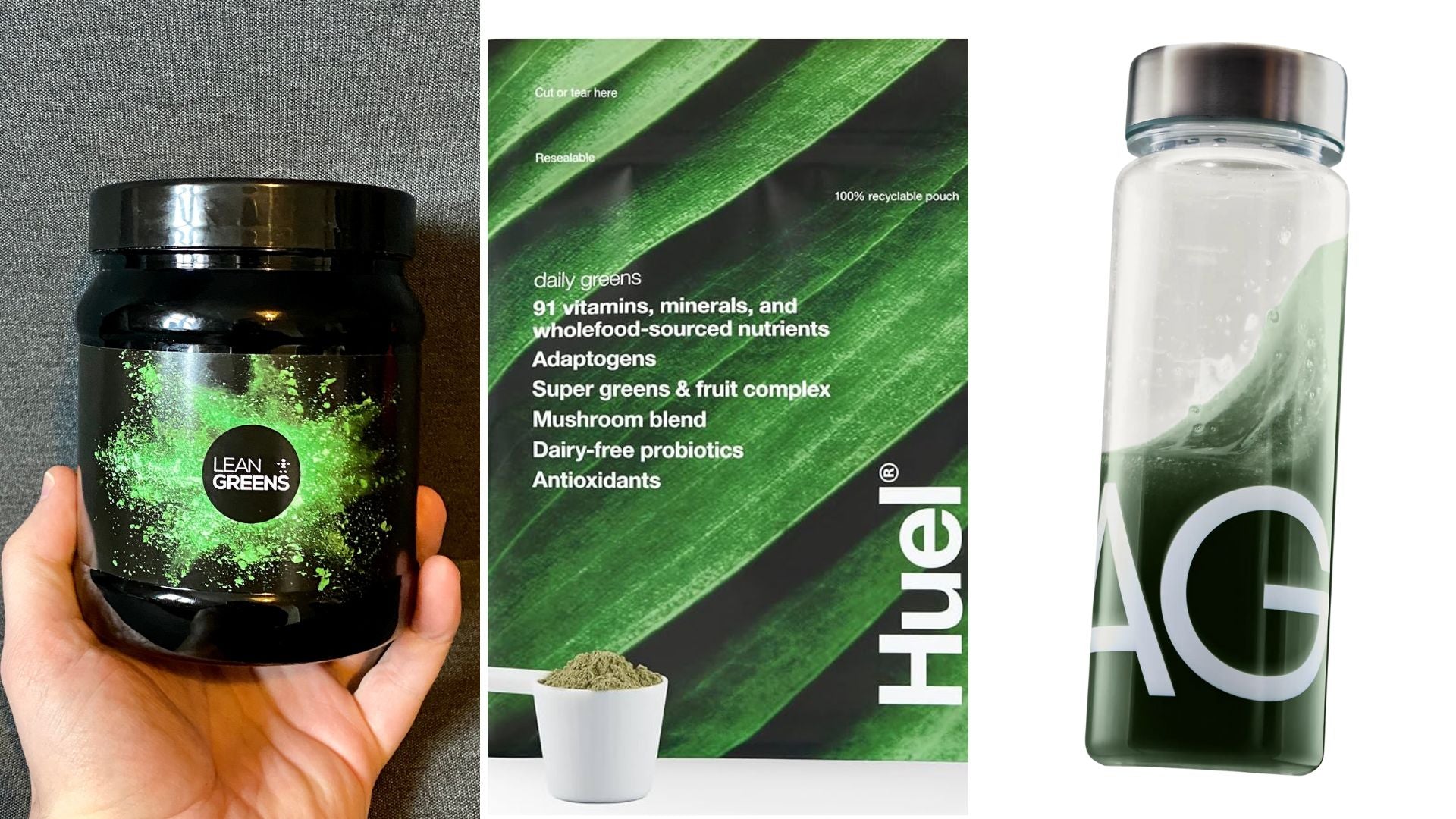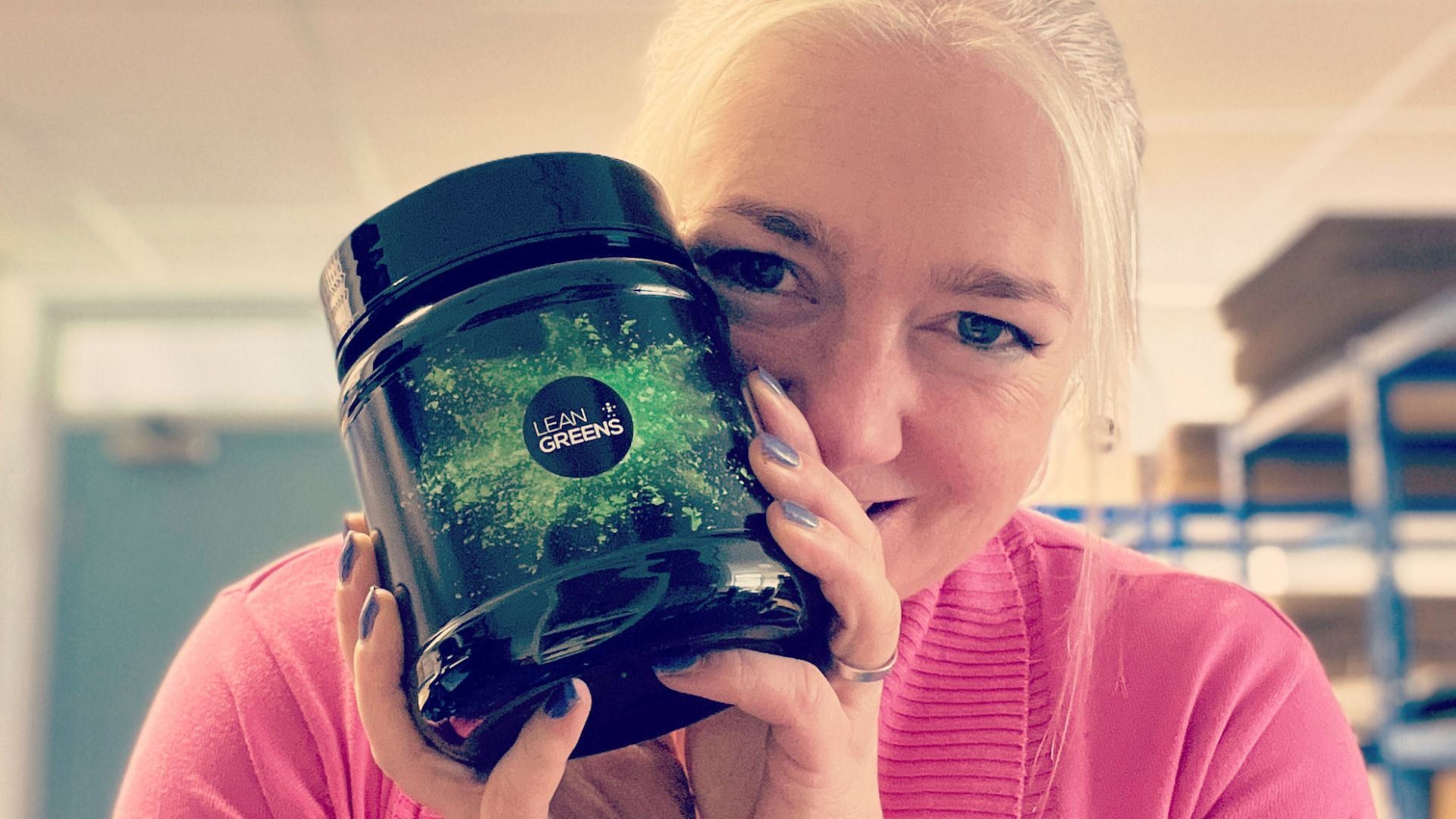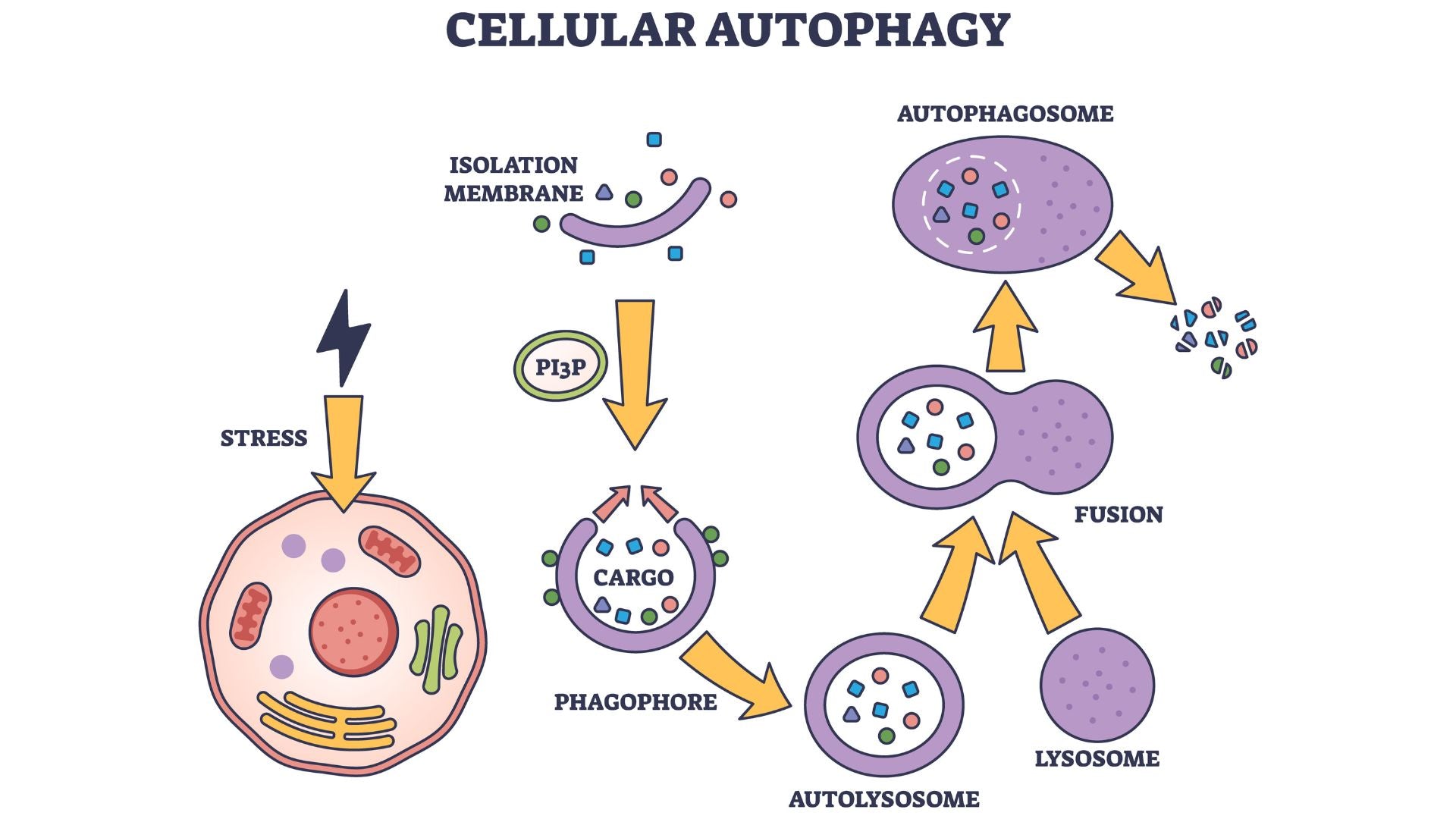Does Drinking A Greens Drink Break a Fast?
June 23, 2023 8 min read

If you're juggling both fast protocols and nutritional supplementation. One question that often comes up is, "Does drinking a greens juice break a fast?" In this article, we refer to our experience to get specific with intermittent fasting, the nature of greens juices, and whether they can coexist harmoniously.
The popularity of green drink supplements such as AG1 by Athletic Greens, Rheal superfoods, and Huel has risen over the past several years to be parallel with innovations like Lean Greens, who have been making greens powder supplements in the UK since 2012.

At the same time the popularity of intermittent fasting has grown. So the question is, will greens like AG1, Lean Greens or Huel break a fast?
- We will explain what fasting is and the health benefits associated with it.
- We will delve into the nature of greens juice and its nutritional profile.
- We will examine whether drinking greens juice can interrupt a fasting state.
- We will provide expert insights on how to incorporate greens juice into your fasting routine.
- Finally, we will recommend some of the best greens juice options available.
Table of Contents
What is Fasting?
Fasting is a dietary approach where one abstains from eating for specific periods. The goal of fasting varies among individuals - some do it for weight loss, while others view it as a path to detoxification or spiritual enlightenment. However, one common factor remains: during a fast, the intake of food or beverages with caloric value is typically off-limits.
Intermittent Fasting Methods and Greens Juice
Different fasting methods may influence whether consuming a greens drink will break your fast. Here are a few common fasting methods:
-
The 16:8 Method: This method involves fasting for 16 hours and eating during an 8-hour window. During the fasting period, you shouldn't consume any calories, including those from greens powder supplements. The 16:8 method lends itself well to drinking Lean Greens as super green drinks provide most of the nutrients you need in a quick drink. This means you don't need to worry about cooking multiple large meals in your 8-hour window.
-
The 5:2 Method: This popular method involves eating normally for 5 days of the week, while limiting your calorie intake on the remaining 2 days. During the fasting days, consider a single 500-600 calorie meal. Green supplements can be excellent options for breaking the fast on these days, offering a nutrient-rich option that won't push you over your calorie limit.
-
The Alternate-Day Method: This method involves eating normally one day, then fasting the next. To still eat some calories on your fasting day, you could consume a nutritious snack, such as Athletic Greens AG1 or Lean Greens. Lean Greens smoothies are best consumed on an empty stomach to ensure all the nutrients are absorbed, making them a perfect breakfast choice on fasting days.
-
One Meal a Day (OMAD): This challenging protocol involves eating just once per day, typically within a feeding window of one hour. This method can be tough, especially for those new to intermittent fasting.
The 7 Types of Intermittent Fasting
| Type of Intermittent Fasting | Description | Pros | Cons |
|---|---|---|---|
| 5:2 Fasting | Eat normally for 5 days, then restrict calories on 2 fasting days | Flexibility in food choices, easier to adhere to for some | Potential hunger on fasting days, may not suit those with high-intensity exercise routines |
| Time-Restricted Fasting | Choose a daily eating window with a 14-16 hour fasting period | Promotes autophagy, optimization of fat metabolism | Requires consistency, may not suit those with irregular schedules or frequent social engagements |
| Overnight Fasting | Fasting for a 12-hour period every day | Easy to implement, still promotes some cellular benefits | Limited fasting benefits compared to longer fasting periods, may not aid in significant weight loss |
| Eat Stop Eat | One or two 24-hour fasts per week with normal eating otherwise | Flexible approach, emphasis on responsible eating | Requires self-discipline, may be challenging to adhere to without bingeing or extreme dieting tendencies |
| Whole-Day Fasting | Eating one meal a day | Effective for calorie restriction, potential weight loss | Difficulty in getting all necessary nutrients in one meal, hunger and cravings may be challenging |
| Alternate-Day Fasting | Fasting every other day with a reduced calorie intake | Effective for weight loss, potential improvement in markers | Hunger and dissatisfaction with portion control, adherence can be difficult |
| Choose-Your-Day Fasting | Time-restricted fasting on selected days or intermittently | Adaptable to different schedules and lifestyles | May have milder benefits, inconsistent fasting periods |
With the popularity of intermittent fasting, the question arises: does everything with a caloric value disrupt a fast? This leads us to the central question of this article: does drinking a greens juice break a fast?
To answer this, we need to understand what exactly is in a greens juice, specifically, Lean Greens' super greens powder. If you want to know more about our super greens powder, check out this article that dives into its benefits and nutritional profile.
Lean Greens' Super Greens Juice

Our Super Greens Juice is a blend of potent vegetables, herbs, and nutrients designed to provide a nutritional punch. It's a convenient way to get your daily servings of greens without the hassle of juicing fresh vegetables. The ingredients include wheatgrass, spirulina, chlorella, digestive enzymes, and a host of other beneficial components.
In essence, Super Greens Juice is a low-calorie, nutrient-dense supplement. It's packed with vitamins and minerals, but does its consumption break your fast? To answer this, we'll need to explore the process of fasting a bit more deeply and see how consuming a drink like our Super Greens Juice might affect it.
For a detailed comparison of Super Greens Juice and fresh vegetables, you can visit our blog post here.
The Nutritional Profile of Our Greens Juice
A single serving of our Super Greens Juice contains approximately 55 calories, which might seem inconsequential. However, when it comes to fasting, it's not just about the calories. The type of nutrients and their effects on our body are also important.
Our Super Greens Juice is low in carbohydrates and sugars, which means it won't cause a significant insulin response. This is crucial because a surge in insulin levels can potentially break a fast. Our Greens Juice is also packed with fibre, which aids digestion and helps keep you feeling full without adding to your calorie count.
Here's a full table of the Lean Greens ingredients and their potential health benefits:
| Ingredient | Potential Health Benefits |
|---|---|
| Wheatgrass Powder | May boost immunity, help in detoxification, assist in digestion, improve skin health, and provide a rich source of vitamins and minerals. |
| Barley Grass Powder | May enhance immunity, detoxify the body, improve cardiovascular health, and offer anti-inflammatory benefits. |
| Spirulina Powder | Known for being a rich source of protein and vitamins. May boost the immune system, help control blood sugar and cholesterol levels, and exhibit antioxidant properties. |
| Chlorella Powder | May enhance immunity, detoxify heavy metals, support fat loss, and improve cholesterol. |
| Alfalfa Powder | Could aid in lowering cholesterol, reducing symptoms of menopause, and providing a source of vitamins and minerals. |
| Spinach Powder | A concentrated source of vitamins, minerals, and antioxidants. May improve eye health, reduce oxidative stress, and aid in blood pressure management. |
| Broccoli Powder | Could help in cancer prevention, improve bone health, enhance detoxification, and provide antioxidants. |
| Carrot | Known for improving eye health due to high vitamin A content. May also aid in cancer prevention, improve skin health, and provide a source of fibre. |
| Blackcurrant Extract | May boost immunity, enhance eye health, improve cardiovascular health, and exhibit anti-inflammatory and antioxidant properties. |
| Blueberry Juice Powder | Could improve brain health, aid in heart health, provide anti-aging effects, and exhibit antioxidant properties. |
| Bromelain | Could aid in digestion, reduce inflammation, and help in sinusitis treatment. |
| Amylase | Helps in carbohydrate digestion and nutrient absorption. |
| Protease | Helps in protein digestion and nutrient absorption. |
| Lactase | Aids in lactose digestion, which can prevent symptoms of lactose intolerance. |
| Lipase | Assists in fat digestion and nutrient absorption. |
| Cellulase | Aids in fibre digestion, which can improve overall digestion and nutrient absorption. |
| Green Tea Extract | Known for its antioxidant and anti-inflammatory properties. Could also improve brain health, aid in weight loss, and enhance cardiovascular health. |
| Siberian Ginseng | May enhance immunity, improve mental performance and feelings of wellbeing, and provide anti-fatigue effects. |
| Stevia Leaf | Used as a zero-calorie natural sweetener. May also aid in blood pressure and blood sugar control. |
For more information on how to mix our Super Greens Juice for the best taste, check out this guide.
Now that we have a better understanding of what fasting is and what our Super Greens Juice consists of, let's dive deeper into whether or not consuming our Greens Juice can break your fast.
Does Drinking Greens Juice Break a Fast?
The answer to whether drinking greens juice breaks a fast isn't a simple yes or no. It largely depends on your fasting goals and the specific rules you've set for your fasting period.
Fasting for Weight Loss
If your primary goal for fasting is weight loss, then consuming our Super Greens Juice during your fasting window may not be a major issue. The low-calorie content of the juice is unlikely to impact your overall calorie deficit. In fact, the fibre in the juice might help suppress hunger pangs and make fasting easier. The important thing is to ensure that you're still achieving a calorie deficit over the course of the day.
For more on how our Super Greens Juice can fit into your daily habits, check out this post.
Fasting for Autophagy

Autophagy is a cellular process that gets activated during fasting. The body starts to recycle and renew its own cells, a process believed to have many health benefits including anti-ageing effects. If your goal for fasting is to activate autophagy, then it's best to stick to water, black coffee, or tea during your fasting window. Even a small amount of calories from our Super Greens Juice could potentially interrupt this process.
Fasting for Blood Sugar Control
If you're fasting to control your blood sugar levels, then you'll need to consider the potential insulin response that could be triggered by any calories consumed during the fast.
As our Super Greens Juice is low in sugars and carbohydrates, it's unlikely to cause a significant insulin response. However, everyone's body is different, and it's essential to monitor your blood sugar levels to ensure they stay within your target range.
Expert Opinions on Fasting and Greens Juice
Most experts agree that the primary rule of fasting is to avoid caloric intake. However, some argue that consuming a small number of calories (under 50) won't significantly impact the fasting state. This would suggest that our Super Greens Juice, with its relatively low-calorie count, would be acceptable during a fast.
That said, purists argue that fasting should involve zero caloric intake. If you adhere strictly to this belief, then consuming any form of caloric substance, including our Super Greens Juice, would break your fast.
In the end, it boils down to your personal goals and how your body responds. If drinking Super Greens Juice makes fasting more manageable and doesn't prevent you from achieving your goals, then it could be a beneficial addition to your fasting routine.
The Verdict: Does Drinking a Greens Juice Break a Fast?
The number of calories that will break a fast absolutely depends on the intermittent fasting routine that you've chosen for yourself. Some routines allow some specified number of calories during your fasting period, while there are those other routines where they will forbid any kind of calories from finding their way into your system outside of your eating period. In most fasting routines, one is not supposed to eat a single calorie during the fasting period.
With intermittent fasting, it is made possible to take in far less food and, at the same time, provide the organism with all the necessary nutrients. Some of the reasons for fasting can be associated with better weight management while helping control unwanted calorie intake each day. Nevertheless, it is very important that you do not fast just because of a few pounds in your weight. Always consult with your doctor before embarking on any routine fasting.
In addition to these approaches, one ingenious way to break a fast is with green supplements that offer your body an abundance of goodness at one time—just be sure you take something with a good punch of the greens. Consider trying Lean Greens Super greens powder in your eating window. That does sound a good way of keeping your diet healthy in terms of meal-framing; it would make a quite versatile addition to your diet.

Creatine for Women Over 40: You're Probably Already Running Low
February 25, 2026 6 min read
Most women over 40 are low on creatine and don't know it. Here's what that means for your energy, mood, muscles — and what to do about it.

Magnesium Bisglycinate for Sleep: Why One Ingredient Is Never the Full Answer
February 23, 2026 7 min read
You took the magnesium. You did everything right. So why are you still lying awake at midnight? The answer has nothing to do with magnesium not working, and everything to do with what it can't do on its own.

Do Greens Powders Work? Here's What Nobody Tells You Before You Buy
February 20, 2026 6 min read
Read More